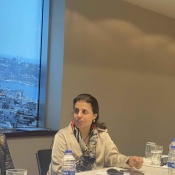Birzeit University’s Legal Clinic participates in Middle East Meeting for Legal Clinics
On 7-10 October 2022, the Legal Clinic of the Faculty of Law and Public Administration at Birzeit University (BZU) participated in the Middle East Meeting for Legal Clinics, organised by the Agence universitaire de la Francophonie (Association of Francophone Universities – AUF) in Beirut. In addition to the BZU Legal Clinic, the meeting brought together 22 legal clinics in five Arab countries, namely, Jordan, Lebanon, Egypt, Iraq, and Palestine. Three French legal clinics also took part in the meeting and shared their experience in establishing and operating legal clinics.
The BZU Legal Clinic was represented by Mr. Mohammed Khadher, Legal Clinic Supervisor, and Dr. Mohammed al-Qeisi, Head of the Law Department, Faculty of Law and Public Administration.
In addition to learning from the experience of legal clinics at French universities, the meeting discussed the requirements for establishing and sustaining legal clinics across the Middle East region. A review included options and strategies that could be used to enhance the ownership and impact of legal clinics in two respects: improving student skills and increasing access to justice by vulnerable groups. Universities from the Arab region shared their experience with creating legal units and presented the goals pursued by these clinics. The presentation covered challenges and difficulties encountered by legal clinics, particularly finding an acceptable position on university organisational structures and ensuring that students are engaged in, and benefit from, legal clinic activities. In this context, Mr. Khadher provided an overview of the establishment, goals, mechanisms, and activities of the BZU Legal Clinic.
In the meeting, a detailed presentation focused on the experience of French universities in creating and operating legal clinics. Besides, the organisational framework governing their functions, the presentation reviewed the needs and mechanisms that helped develop and maintain sustainable function of legal units. A discussion highlighted administrative and financial relationships with university units and academic courses. Participants also debated mechanisms for engaging students in legal clinic operations and increasing student access to the activities carried out by these clinics. An emphasis was placed on the partnerships built by legal clinics to help organise joint activities with community institutions and government bodies, favourably impacting the rule of law and social justice.
Of note, this participation is part of the BZU Legal Clinic’s vision to promote networking and collaboration with different institutions. This is tailored to share experiences and discuss difficulties to legal clinic functions from a comparative perspective, including their internal and external relations. It also covers lessons learnt from creating and putting to operation legal clinics in line with the domestic legal framework, in-house organisational context, and specific goals sought by these clinics. Ultimately, the main goals of legal clinics will be accomplished, namely, improved student skills and better access to justice.








